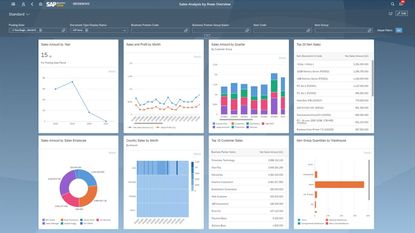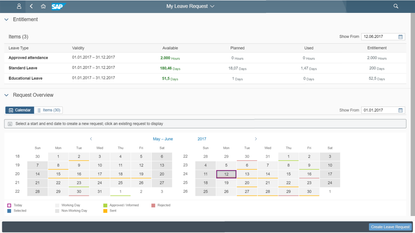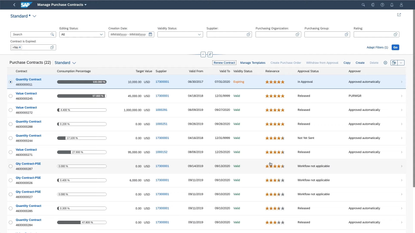Top SAP Competitors and ERP Alternatives in 2023
SAP has always been one of the leading multinational software corporations that produces enterprise resource planning software (ERP software). The SAP ERP options available today are some of the most well known on the software market. However, their software offerings are not for everyone.
The Best SAP Competitors of 2023:
1 NetSuite - Best Overall
NetSuite from Oracle is well-known in the ERP world for its extensive customization, and powerful integrations. We like that it offers industry-specific software editions. What’s more, it integrates with eCommerce platforms, point-of-sale applications, and more.
However, it can be costly due to expensive implementation fees and annual subscription plans. Expect to invest invest time and resources in training staff on the software; the sheer number of functionalities offered can come with a learning curve.
One recent review highlighted it’s accounting capabilities:
Able to customize just about everything. Integrated accounting to ERP system. Ability to build reports exactly how I want them. Able to use from anywhere with no hardware to manage. Able to audit employees work. Easy drill downs make it easy and quick to access info you need. Easy to change/fix mistakes - every record is editable. From a top level executive/accounting perspective, awesome system. Mary Adams, Adams Horse Supplies
2 Dynamics 365 Business Central - Also Great
Microsoft’s Dynamics 365 Business Central shines as an ERP for its user-friendly interface, product integrations, and accounting module. We liked that it includes audit trails, multi-currency, and multi-language support. It also automates recurring tasks like invoicing and reporting.
However, if your business does complex manufacturing, it’s probably not the best fit. For tasks like machine monitoring and shop floor control, we suggest a dedicated manufacturing ERP system. Finally, Microsoft doesn’t offer a free trial.
One user felt the best benefit was it’s scalabilty:
Microsoft has swung the pendulum the other way and now has a full ERP at a very reasonable price point… …the Essentials package takes care of everything fundamental except for manufacturing and service. The general ledger, payables, receivables, ability to cut checks, budgets, consolidations, multi-currency, are all included in Essentials. It’s a mid-market ERP, so you can sell stuff and ship stuff. It’s great if you need project accounting and things like that. Andrew King, WebSan Solutions
3 Oracle ERP Cloud - Best for Large Enterprises
Oracle Cloud ERP is an integrated suite of business modules comprised of various ERP products depending on your needs. The cloud applications assist with your business functions of finance, project management, procurement, risk management, and other day-to-day activities.
The Oracle Cloud is ideal for customers seeking subscription-based access to leading Oracle applications, middleware and database services–all hosted and expertly managed by Oracle. Some of the top Oracle Cloud ERP applications include Financials Cloud, Procurement Cloud, Risk Management Cloud, EPM Cloud, and SCM Cloud.
A recent Software Connect reviewer described how it gave them a leg up over their competitors:
We wanted to be ahead of the curve so we were one of the first to go live on the ERP Cloud Financial system from Oracle. By utilizing technology, we were able to maintain our efficiency ratio which gives us a huge advantage over our competitors. We rely on Oracle to develop the best practices rather than follow the best practices. Neil Martucci, ConnectOne Bank
4 SYSPRO - Best for Distributors
SYSPRO is a major developer in the ERP world. Since 1978, it’s built a solid reputation in the manufacturing and distribution sectors. It shines for its modularity, intuitive user interface, and industry-specific features. We also found its rule-based product configurator worth mentioning, linking directly to your production modules.
Whether you run discrete manufacturing or batch processes, SYSPRO supports real-time finite production scheduling, real-time shop floor control and short/long production runs in custom job shops.
SYSPRO gives single or multi-location distributors, wholesalers, importers or over-the-counter retail operations the tools to optimize inventory management in order to maximize profitability.
An anonymous SYSPRO user described some of their pros of using SYSPRO:
[SYSPRO] tracks inventory and costs in details. Integrates easily with MS-Office tools, especially Excel, Outlook and Word. Designed ground-up for manufacturers and distributors. Workflow - for accounting and procurement process. Pretty powerful and integrated software. Easily customizable without a developer. Stable and low total-cost compared to other ERP products. Anonymous
5 Epicor Kinetic - Best for Manufacturers
Formerly known as Epicor ERP, Epicor Kinetic is renowned in manufacturing and distribution. It features extensive product configuration, discrete manufacturing capabilities, and powerful customizations. We also liked having the option to make limited code adjustments to the software to avoid over-customization.
However, we found Kinetic’s CRM and HR modules lacking. Though it offers multi-company management, Kinetic is not the best option for multinational organizations with numerous product lines.
A recent Software Connect visitor said the following about their Kinetic experience:
From quote to manufacturing to sales and after sales service Epicor 10.1 does what you need it to do with real time reports that you can design and customize to fit your needs. I love the way Epicor 10.1 has all the data at my fingertips. I can see it in a query, dashboard, report or extract the data to use in other reporting packages. Chris
Does SAP Have The Best ERP Systems?
While SAP does have a number of top ERP systems, many companies have developed solutions equal to or better than what is included in their offerings. Every business has different functionality needs and a different budget, so it can be difficult to outright say they are the best ERP system.
Pros and Cons of SAP ERP Systems



What Does SAP ERP Software Cost?
The cost of ERP systems from SAP will start as low as $410/user/year, or roughly $35/user/month. Multiple elements influence the final price of your ERP solution, including the software provider, the delivery method, payment structure, number of feature modules or extras, and your company’s scale among others.
Typically, a cloud-based ERP system is more economical than an on-site one. The high upfront costs and hefty yearly maintenance fees associated with traditional ERPs are replaced by consistent, affordable monthly charges in cloud-based ERPs.
In the end, the value provided by an ERP should be significant enough to cover its costs, via the actionable insights it provides, the increased efficiency it drives, and the cost reductions it facilitates.
Who are SAP’s Biggest Competitors?
Companies like SAP have traditionally been leaders in this space. Over time, small businesses desired to find an ERP system that helped streamline their workflows and business processes, provide visibility into their workflows, and give better financial planning and decision-making.
The top competitors mentioned above include NetSuite, Microsoft, Oracle, SYSPRO, and Epicor.
What Is The Best Alternative to SAP?
Companies looking for SAP ERP alternatives may want to change ERP systems for a number of reasons:
- Over-reliance on 3rd party applications
- Data kept in disparate systems
- Desire to move from an on-premise deployment to the cloud
- Looking for something less expensive
Our list of alternatives was curated by the software experts at Software Connect. This was accomplished by finding options that are traditionally reviewed alongside SAP ERP solutions.
History of SAP ERP
ERP software was originally developed for large manufacturers, with a focus on providing end-to-end capabilities between all departments. This includes sales, inventory, finance, production, and shop floor execution.
Today, the scope of ERP systems is constrained by the variety of business operations present in the market and the ability of software developers to keep up with new requirements. ERP modules are available for virtually every task, program, or function that a business performs.































